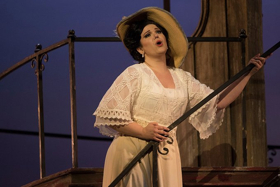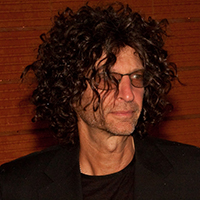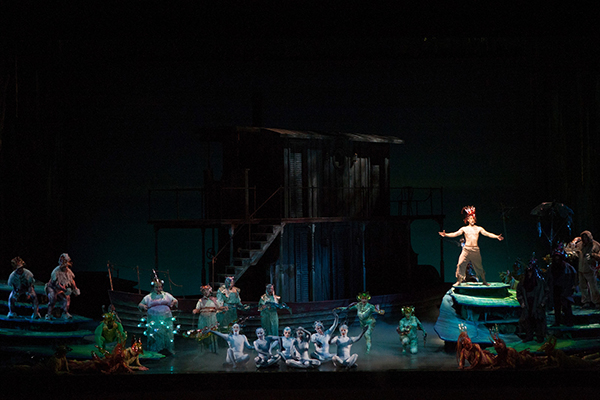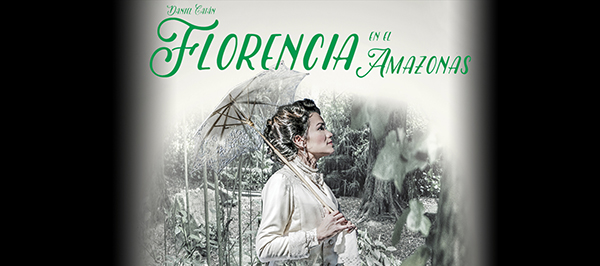Interview: Elaine Alvarez of San Diego Opera's Production of Florencia en el Amazonas

I spoke recently with Elaine Alvarez who will be singing the lead role this weekend in the San Diego Opera's production of Florencia en el Amazonas by Mexican composer Daniel Catán and librettist Marcela Fuentes-Berain. Alvarez told me that when she got a call from the San Diego Opera General Director David Bennett, "I was at a train station in France, and it was cold. I started jumping up and down! And he was like, 'Do you think you're going to be ready to sing this? Is this in line now with where your voice is.' And I'm like, a hundred percent! Yes! Yes! Yes!" Florencia appealed to her Latin heritage, she knew her voice was ready, and Spanish was her first language. She'd sung Beatrice in Catán's earlier opera Rappaccini's Daughter and was delighted with the opportunity to make her San Diego debut with another of his works.
Alvarez enjoyed performing even as a toddler. Her mother, Yasmin Alvarez, was a music teacher in Cuba. She continued her studies in Miami where Elaine was born, going on to become a music professor. "There was always music in my house." Yasmin, intrigued by the "Mozart effect," experimented. She noticed her daughter was constantly singing and imitating her. And every time Mozart's harp and flute concerto was played, "I would freak-out in my crib jumping up and down." A little later it became clear Alvarez loved the reactions she got when she was performing. Her mother plays classical piano and guitar but learned early-on she wasn't comfortable playing for an audience. "She got all the stage fright and it skipped me (laughs). There are all these photographs of me as a toddler standing on the coffee table performing for my grandparents, and there were so many people living in my house, I always had a big audience!"
She's gone on to much bigger audiences after attending the Manhattan School of

Music, the Music Academy of the West, the Academy of Vocal Arts, and studying with, among others, Renata Scotto and Marilyn Horne. She won the Marilyn Horne Foundation Competition and also spent two summers with Horne at The Music Academy of the West in Santa Barbara that "were unbelievably informative" because of the high caliber of people she met and worked with.
"My first voice teacher trained me as a lyric coloratura. [She continues to warm up with coloratura passages to maintain youthful agility.] The majority of what I worked on in undergraduate and grad school was Bel Canto ... The great thing about that is it's quite healthy, as long as you're moving your voice flexibly, naturally, you're not going to do any damage to it. That era doesn't require a lot of weight in the sound." The teacher told her it was obvious she'd be a bigger voiced soprano, but if she pushed too hard she'd risk blowing out her voice. "Of course I wanted to sing Puccini and Verdi, but my teacher said, 'Nope, nope. We're doing song literature, we're keeping it light.' Towards the end of grad school I sang Mimi for the first time ... Mimi was a perfect fit from the beginning. This was when I felt home for the first time. This was my voice."
Her professional debut came as Pamina in Oper Leipzig's 2006 production of Mozart's The Magic Flute. "Which has to be one of the most ill-fitting roles (laughing) that I've ever attempted. But it was a natural thing that you would give a 26-year old. Once I sang it I said I am never singing this opera again. It was a terrible fit, and I felt like a bull in a China shop." But it was a learning experience, she didn't sing badly, and the right fit wasn't long in coming.
The following year she was second-cast to Angela Gheorghiu as Mimi, and the famous soprano was released by the Lyric Opera of Chicago after missing six of ten rehearsals. Alvarez's stand-in performance got star-is-born reviews. The Chicago Tribune said, "The voice bloomed under pressure the way you want a Puccini voice to bloom, yet kept its warm tonal finish when she floated the high pianissimos opera lovers wait for in rapt anticipation." In addition to good reviews, Alvarez's performance led to a friendly relationship with the production's director Renata Scotto, who continues to offer career advice. "Scotto is part of a generation that knows how to spot talent when it is still in development."
At least she had a few days' notice before going on in Chicago. When she backed up as Violetta in 2009 at Munich's Bavarian State Opera, the singer in the role became ill at the last moment. "I had a quick costume fitting, a half hour with the conductor, and then it was, OK, this is where you're coming in, this is where you're going to exit. At the end of the second act you need to be in front of the curtain instead of behind it, and the stage is covered with leaves, so try not to fall!" There wasn't a whole lot of time to be nervous.
Since then Alvarez has sung a wide variety of roles, lyric to dramatic, Verdi to Korngold and Catán. She believes you need to try a lot of different things before you can, "Figure out what you really do best. I don't want to be good in a lot of different areas. I want to be really excellent at something specific. In this part of my career I have a laser focus on Puccini, Verdi, and some French."
As her voice matured, it gained power without losing agility. At 37 it now falls into the relatively infrequently used soprano category of spinto d'agilitá. She can sing Puccini for lyric sopranos, but also "push" to heavier roles such as Bellini's Norma. Scotto told her, "Yes! That's where you need to go." Her close relationship with Opéra Royal de Wallonie in Liege, Belgium has helped her move in that direction, and she's excited about the possibility of a role there next season (not Norma) that would be "a giant dream come true." She's also hoping for more Verdi, and is in talks with a company about Don Carlo.
Early Verdi operas such as Luis Miller also appeal because, "They really zoom in on the qualities that are unique to my voice, that I have a lot of power but I have a lot of agility ... When you look at the earlier operas though, they all have ridiculous plots. Ernani is one of the most ridiculous plots I've ever--I'm literally the entire show convincing the tenor not to kill himself. It's a very strange, strange opera. I end up being pursued by my uncle. I have an affair with the king. But it's cool!" It's the beginning of the evolution of a genius. "The later works are more about the power and drama in the voice."
When our discussion turned to the current state of opera Alvarez said the recession caused serious problems, both economic and artistic. Many donors were lost and the recording industry collapsed. Marketing has reacted by pushing companies to rely more on youth and physical appearance. There's the "New element of HD broadcasting that requires us all to look like movie stars in addition to having the training that's required for a professional opera singer." She feels this has resulted in the loss of a whole generation of singers. Marketers and casting committees can seldom match a Scotto's eye for talent, artistry and potential. "Sopranos don't move into their best years until 35 or 45. At 27 I'm worlds away from moving into what my best repertoire is going to be. After I turned 30 and my voice started to change and gain weight, moving into roles such as early Verdi was a natural fit because I'd grown into them. I could wield the weight in my voice, I could handle the power and stamina that was required of me in these roles."

The recession affected Alvarez directly. When work dried up in New York, to supplement her income, she worked as an assistant to a senior VP at Sirius radio for a year. "It was for the Howard Stern show. And it was wild, like joining the circus. At first I didn't want anybody to know I was an opera singer. But soon Howard found out, and it became a thing. I had to sing on the show almost every day. He loves individuality, things that are unique, and having an opera singer on hand all the time was amusing to him. I loved working with the writers there. They're real comedians, and hilarious. It got to be fun. In the beginning I cannot believe (laughs)--I'm like, don't put my name on anything! But he kept saying my name on the air, and the fans soon outed me on Facebook and Twitter."
Her career got back on track in the 2012/13 season.

Alvarez is excited about the upcoming San Diego production. "It's not Verdi. It's not Puccini, but it's mine in a different way. I love that it is a Latin American composer writing in Spanish. Catán's ability to translate the Latin American experience into sound is exceptional." The entire cast is enthusiastic about stage director and choreographer Candace Evans' inventive approach. "The set is really cool. We're on a full-sized boat ... The chorus, of course, is the Amazon. They're the creatures. They're the river. Wait until you see what the chorus is doing. They are in head-to-toe leotards as lizards, frogs, birds. They're doing an amazing job, and sound amazing. And they seem to be having fun!" Some even lost weight when they learned they were going to be in leotards.
Elaine Alvarez has had hit lows and highs in her career, but in a sunken outdoor theater in Athens it became crystal clear why she was doing it. "I wasn't singing in one of the movements. It was packed. Completely sold out. I look up and there's the Parthenon and a full moon behind it. The orchestra is playing, the chorus is singing, and Muti is there with his hair all over the place from the wind. And I thought, I can't believe this is my life. It's like a postcard. The realization of all of the dreams I had when I was kid."

For ticket and season schedule information visit San Diego Opera. Marilyn Horne
and Howard Stern photos from Broadway World archive, others courtesy San Diego Opera.
Comments

Videos


